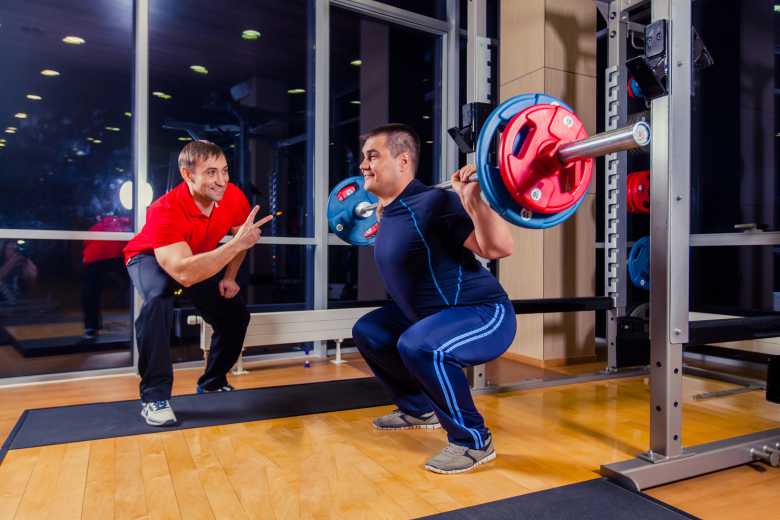
Personal Trainer Skills | Hard & Soft Skills
18 Key Personal Trainer Skills
If you're thinking about a career in Personal Training or just qualified and looking to understand what core attributes are required to be successful in this role, this is the article for you.
We break what skills are needed to be a Personal trainer and most importantly, why they are important to master.
Looking for a Job in Personal Training?
Active Careers is the UK's Largest Jobs Board for the Fitness Sector
1) Understanding of Anatomy and Physiology

Grasping the fundamentals of human anatomy and physiology is crucial for a personal trainer.
It's important to have a thorough knowledge of muscle mechanics, the bodies systems and how the body's reacts to different types of physical activity and intensities.
Think about it this way, how can you write a programme for an individual without fully comprehending how the body will react to that particular workout or programme? This is why knowing your human anatomy is a key skill required to be a Personal Trainer.
Having a good understanding of anatomy and training principles allows you to keep your clients routines optimsied for performance, safe from overtraining and injury and how you can best advise them on recovery.
Additionally, you need to know how anatomical adaptations come about, what causes them and how all systems interact with another as otherwise youre going to struggle to influence and positively affect what you don't understand.
2) Be Adaptable

Being adaptable is an understated personal trainer quality as trainers frequently encounter clients facing motivational hurdles or obstacles in their fitness path that are unique to them.
Demonstrating patience and empathy towards clients is essential in fostering trust and nurturing a positive, encouraging relationship.
Every person is an individual with different aspirations, attitudes towards exercise and preferences on how they like to be communicated with, hence you need to be adaptable with how you approach each and every client and change your approach accordingly.
You also need to harness adaptability when changing mindsets between different tasks. You have to switch your mindset constantly throughout a typical day, from being upbeat and energetic during a PT session to being more relaxed and strategic when implementing a marketing idea.
How to Improve Adaptability with Clients:
Work on adjusting your communication style based on the client you're working with
Listen to feedback and make changes based on that feedback where required or you feel is neccessary.
Look for the positive in setbacks and harness the positives into creating a positive mindset.
3) High Levels of Professionalism and Ethics

Next on our personal trainer skills list is professionalism.
This entails upholding client confidentiality, ensuring you're punctual, prepared and ready for clients sessions. This is a personal trainer attribute that clients do not forgive if you don't meet their expectations.
Professionalism extends to how you present yourself, the language you utilise during sessions, how you go about communicating with clients, the respect you show others, as well as maintaining basic hygiene and appearance.
Personal Training is a profession and thus clients expect that you're well educated and versed in your job role and have a wide breadth of knowledge on training styles and don't struggle to answer basic training related questions.
A key part of being professional is the eyes of a client is putting their needs and goals first, being really client focused and bringing positivity into their lives.
Ethical conduct also involves adhering to one's professional boundaries, maintaining a professional relationship with your clients and also being honest with them regarding their sessions and goals.
How to Improve Professionalism with Clients:
Always plan to get to or be ready for sessions early so you have enough time to effectively prepare
Set extra time aside in the morning to make sure you look the part
Treat everyone as your equal and show respect to their individual circumstances.
Aim to exceed what you think clients want
4) Communication Skills

Clear communication is essential for grasping clients' objectives, worries, and tastes. It includes articulately describing workouts and exercises, offering constructive feedback, and talking about dietary strategies in a comprehensible manner.
Communication is not just restricted to face to face sessions. How you communicate to your clients over email, social media, via a newsletter and your website will impact your business growth and client retention.
Good communication comes from active listening and really finding out what your clients want from you, what their preferred method of communication is and how they liked to be communicated with.
How to Improve Communication as a Personal Trainer:
Avoid using overly complex language or industry jargon that can confuse clients
Always pause before you speak and give yourself that extra second to compose what you're going to say
Be concise and specific when giving instructions during PT sessions.
5) Motivational

When thinking about “what skills are needed to become a personal trainer”, being motivational is probably one of the first things that springs to the top of your head, and it is important, but probably not in the way you think.
When you think of motivation, it’s probably how you can push clients during your sessions to lifting one more rep or completing their last shuttle run.
In fact, motivation largely comes away from the gym floor entirely through setting attainable goals and understanding the real driving force behind why your client is using your services, what their ambitions are and also what are their pain points that has initiated them to hire a PT in the first place.
You can motivate your clients by breaking down their goals into smaller mini goals, celebrate those goals as and when they are achieved and
showing them clients success stories of what people have achieved similar to them, celebrating small milestones on their journey and providing them constructive feedback on their progress.
How to Improve Motivation in Clients:
Set small mini Goals
Tell them your expectations of what you want from them
Recognise effort over results
Discover Jobs in Personal Training with Active Careers
Active Careers is the UK's Largest Jobs Board for the Fitness Sector
6) Time Management
One of the most important key skills for a personal trainer is time management.
You need to juggle conducting sessions, writing programmes, admin related tasks, your marketing efforts and client communication amongst many other things.
You need to learn how to prioritise your workload and set time aside for certain tasks at the right time of the day.
For example you might have clients in the early morning before their morning commute, but then set aside your more administrative tasks such as programme writing, updating your sales system or session planning when it’s quite before the lunchtime rush, this is time management, a critical skill required to be a personal trainer.
How to Improve Time Management as a PT:
Create a plan for each day and assign the tasks around the time of the day the tasks need to be implemented
Set deadlines for tasks and hold yourself to those deadlines
Avoid multi-tasking and concentrate on one objective at a time
7) Professional Self-Growth

A skill needed to be a Personal Trainer is to constantly work on your professional development and enhance your craft. Like every profession, continuous learning is important to helping you become a better trainer.
You might want to deepen your knowledge in specific disciplines of training such as strength and conditioning injury rehabilitation, or you might want to know how to write a programme fro a particular niche or demographic.
Some of these require specific qualifications but they can vastly improve your knowledge, but also prospective earning potential by allowing you to explore new demographics and routes to market.
A critical part of self-development for a PT involves improving your interpersonal skills or "soft personal training skills", and how you come across to your clients. Identify areas that you're lacking and create a plan of action to how you're going to enhance these skills, whether that's through role playing,
Self growth comes in many formats, whether you take out a course, role play certain scenarios, watch an educational video on Youtube, listen to a business podcast or shadowing another Personal Trainer.
There is no end date to professional self-growth, you need to constantly refresh and improve yourself in what is a fast changing industry with new training styles and
How to Implement Professional Growth as a Personal Trainer:
Identify and be honest with yourself about your weaknesses
Seek advice for from an industry peer or a mentor
Spend time furthering your education
Set time aside several times per week at a quiet time to work on your self-growth
8) Knowledge of Nutrition

A mandatory hard skill for any personal trainer is having a solid awareness of nutrition. This does. not mean you must be a nutritional guru!
Providing basic nutritional advice on dietary habits either via a nutrition programmes or verbally, is a requirement for any reputable PT.
It's vital to grasp fundamental nutritional concepts, comprehend their influence on fitness and overall health, and deliver recommendations to clients that will help them reach their fitness objectives.
You will need to be proficient in everything ranging from understanding portion sizing, macros, micros and calorie deficit through to how to cater for clients with particular medical conditions and dietary requirements.
Nutrition is a mandatory unit within all Ofqual regulated level 3 Personal Training qualifications, but you can delve into further, more specialist nutritional qualifications to further enhance your knowledge.
9) Approachable and Building Rapport

Being friendly, approachable and being able to build rapport is a crucial skill for a personal trainer.
When trainers are approachable, clients feel more comfortable giving honest feedback and can make it easier to discuss sensitive topics like eating habits and lifestyle choices.
Most crucially though, clients are more likely to continue working with a trainer who is personable and makes them feel comfortable and valued.
The rapport built through a friendly demeanor encourages long-term commitment and thus enhances your client retention rates.
How to improve rapport building as a Personal Trainer:
Look for commonalities with clients that you can bond over by using asking them questions about themselves such as "what did you get up to the weekend"
Use open questions that begin with what, where, why, how, who and when to get clients to open uo and apply active listening to ask further questions to start developing that relationship.
Use neutral topics to talk about that resonate with all of us, such as the weather, traffic, time of the year or events.
10) Sales

You can be the most creative and engaging personal trainer who writes the most innovative plans, but if you have nobody to share them with you ultimately will fail in this career path.
Having the ability to sell yourself and your services articulately is an essential skill needed for a personal trainer to be successful. The best part is that it can be learnt.
Being able to understand and implement a sales process, relate to people of different backgrounds and be able to translate how you and your services will benefit the client are all part of what sales is.
Sales is about generating trust that you can genuinely help the client reach what they are looking to achieve and that your value is higher than with other trainers.
How to Improve your sales skills as a PT:
Undertake a sales course
Shadow a sales consultation from another reputable trainer
Break down the sales process into small segments and role play each segment
11) Meet Deadlines & Be Resilient

An underrated skill that a personal trainer needs is the ability to meet tight deadlines and work under pressure.
Outside of delivering PT sessions you’re often having to work to fairly tight deadlines to get programmes developed, nutrition plans written, workouts scheduled as well as being prepped for client assessments and progress meetings.
All this on top of trying to focus on your marketing, admin and sales efforts means you need to be disciplined and resilient to meet these pressures.
How to Improve Meeting Deadlines as a PT:
In order to meet deadlines consistently, you need to know and fully understand the level of work to actually meet the deadline in the first place
You need to segment the workload into smaller chunks and then associate a time span for each segment to properly budget your time
Create a mini-checklist which you can tick off as you go and make sure to log how long individual tasks take so you can adapt for future reference.
12) Organised
Being organised ties into time management that we mentioned earlier, but it is a different skill for a PT to master.
Being organised is having all sessions planned in advance, ensuring that each training session is well-structured and thought out. Having a structure and system in place for all aspects of your business including your marketing, admin tasks, social media management, sales and client communication to name a few.
If you’re disorganised it will soon become apparent to your clients and negatively affect your professional image, resulting in potential lost earnings and increase of your own stress levels.
How to Improve organisational skills as a Personal Trainer:
Always plan a week ahead of schedule. This includes your PT session plans, your marketing, bookkeeping, programme writing etc. This keeps you one step ahead at all times.
Use software where possible to automate tasks, plan your schedule or help you with programme writing. Harnessing of software in the modern age is a must for staying organised as a Personal Trainer.
Allocate time after consultations and PT session to record and document activities within your PT business.
13) Strategic Thinking

Personal Trainers that have the capacity to be good strategic thinkers tend to do well within this industry as they can look beyond the day day routines of the job.
Strategic thinkers can evaluate gaps in the market and implement ways to beat competitors and are good at managing their time and resource.
Being good at strategist enables you to easily identify opportunities and create action plans that help with their long terms success.
For example, if a Personal Trainer wants to attract high end clientele and stand out from other Trainers, they might offer a complementary towel and drink service for ever session to clients, which creates a more luxury feel. A strategic thinker would also cater for the extra overheads this creates, time to wash towels and pre drinks and will have factored this service into their business plan.
How to Improve strategic thinking as a Personal Trainer:
Evaluate all your systems of what a client experiences and plan how these could be done better or faster. This extends to how you administer programmes, your sales pitch, package structure, your branding documentation, social media and everything in between.
Understand that their are pros and cons to every decision and system, and that you should weight up counter arguments to why you should or shouldn't do something and then proceed once you have determined the best way forward for your PT business.
Be proactive, not reactive. Strategic thinking is about planning and forecasting your success for the future. Start planning ahead of time for months on how you're going to scale your business or how you're going to improve service or target a certain demographic.
14) Flexibility

Clients all have different lifestyles, needs and requirements and as a trainer, you need to be flexible to those dynamics.
Firstly, you need to be flexible to your clients schedules, clients won’t compromise much on when they want training as they may have kids or busy work schedules, thus offering session early mornings, evenings and weekends is almost mandatory.
You will need to be flexible to clients day to day mood, perhaps they are feeling like fatigued, have sustained a minor injuries or simply not feeling up to the session. You will need to think on your feet and have contingencies in place this sort of scenarios.
A flexible trainer can alter workouts and programmes based on individual clients preferences on how they like to train and adjust programmes based on changes in schedules, which is why being flexible is paramount personal trainer credential to possess.
Flexibility also extends to changing how you deliver Personal Training based on external factors like COVID or if another trainer starts offering a service that you don't or is undercutting your pricing.
How to Improve flexibility skills as a Personal Trainer:
Be open minded to other people's suggestions and feedback. Most of the best ideas I have had for my gym came from other people.
Know what you're willing to compromise on, but also know what you're not! For example, you might be willing to accommodate clients cancelling a session on the day, but you might not ever want to work a weekend and this is where you should draw the line.
Seek avenues to help clients proactively. For example, if you know a client is struggling due to childcare to do an 11am slot on a Wednesday and then another time slot that is more appropriate becomes available, proactively let them know there may be a better time slot for their requirements. This is being flexible and proactive.
15) Marketing

The ability to market your PT business is critical for those in particular looking to become a freelance or an online personal trainer.
Unlike working on the gym floor where your database of prospective paying customers is in front of you, you need to be able to attract new clients to your business, which is a tough skill for a personal trainer to conquer.
The ability to market your services effectively will give you a steady flow of incoming enquiries everyday allowing you to grow your business, can make you stand out from your competition and even help you retain clients.
Marketing extends to everything from your social media presence, ad
You can develop your marketing knowledge via both free and paid courses, some of which that are specifically designed for fitness professionals.
How to Improve your marketing skills as a Personal Trainer:
Use your clients successes as the core to your marketing. Their results and testimonials will shout how good you're as a PT far more than you telling anybody.
You must set time aside to study and learn. There is an abundance of great online resources and free courses within various different forms of marketing, whether you want to improve your social media marketing, understand how to get your website to rank well in Google or how to do email marketing.
Get goal orientated. PTs spend there life's telling clients to set fitness goals, yet don't apply this themselves to their business efforts. Set clear goals of what you're looking to achieve from your marketing using the SMART goal principle.
Lastly, start small and then scale. Put a small budget into your marketing efforts and then evaluate the results. If it works, put more money in and then again so if you get the same proportional return of investment. Continue this pattern, as this is how even monster sized companies operate to maximise their marketing funnels.
16) Passion for the Industry
Whichever career you embark upon, you need to have some underlying passion for what you do.
A genuine passion for fitness and having that "want" to help others with their fitness ambitions is an underpinning quality of a personal trainer that is needed to be successful.
Having an innate passion for what you do inspires your clients, keeps you energetic and motivated during those long days where you may have three clients back to back.
Being enthusiastic for Personal Training will give you drive, make you feel good going to work each day and aid your career longevity.
Being passionate isn't a personal trainer skill per se, but it is fundamental to a successful career and is the first thing you should try and portray to any potential employer.
17) Hard Working

While the ability to be hard working comes naturally to some, it is a developed skill that derives from you and the environment you create.
Personal Training is a hard job, it comes with long hours, difficult clients from time to time and requires you to be good at a lot of varied tasks like marketing, sales, admin, writing and communicating.
Every successful personal Trainer has this characteristic as it's next to impossible to be successful without putting in the work and effort, especially when you have nobody to be accountable to apart from yourself.
You can develop a hard working culture in yourself by creating goals for yourself around your motivations, setting deadlines for tasks, surrounding yourself with other hardworking individuals and always revert back to why your doing this tougher times.
This fitness Trainer skill is no different to your own physical training, where you at times have to push on when you're not feeling quite up to it or it's raining outside and revert back to your main goal, whether that's your trying to put on muscle or trail run coming up.
Tips on how to become more harder working as a Personal Trainer:
Surround yourself with other hard working, like minded people.
Adopt a competitive nature and aim to beat other PTs, even if they don't know they are in your race.
Set goals and hold yourself accountable. Know that you're the one in sole control of your PT business success or failure. It's down to you to make this work.
18) Creativity
The last attribute on our personal trainer skills list is the ability to be creative.
Creativity does not just extend to the obvious, such as writing innovative programmes or creating workouts with alternative equipment, but also to how you market yourself, creating unique selling points to your business and even how your business model is structured.
For instance, you could have a unique way of delivering Personal Training or a creative way of targeting a specialised niche.
A good example of creativity would be Personal Training company Motivate PT who are a London based Personal Training Company. They have got creative by offering home PT sessions to women exclusively and marketed themselves with female trainers and via offering their PTs a borough of London that is their area to cover. This is a creative way of setting up their PT model and has allowed them to scale all across London.
How to Improve Creativity as a Personal Trainer:
Take inspiration from others and what they are doing with their personal training business as well as people from unrelated sectors to discover ideas that you can bend or even improve on for your PT business.
Allow and learn from failures, this is all part of the optimisation process and often gets the creative juices flowing when something doesn't work first time.
Just because everything seems to be done one way doesn't mean it's the most optimal way. Try to challenge conformity and think of alternative solutions to how things within your PT business could be executed.
Search Hundreds of Freelance and Salaried PT Roles
Active Careers is the UK's Largest Jobs Board for the Fitness Sector

